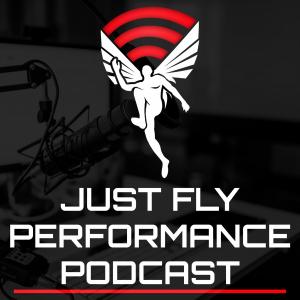Just Fly Performance Podcast

327: Joel Reinhardt on The Fusion of Sport and Strength Training Workloads in American Football
Today’s episode features sports performance coach and sport scientist, Joel Reinhardt. Joel joined Stanford Football’s staff as the assistant sports performance coach and applied sports science coordinator in 2022. Prior to Stanford, has spent time at UMass and Nicholls State working in sports performance and sports science roles. One of the great things about the sports performance/strength & conditioning field is that it is interdisciplinary in nature. Within the field itself, we have the elements of anatomy/physiology, biomechanics, pedagogy, team culture & coaching, training arrangement, and long-term development. We also have the integration of sport science, which quantifies the complex nature of the ways players are loaded in their sport. When the nature of this load is understood; many relationships can be noticed between a football practice week, for example, and the way a track sprints or jumps coach may set up their training week. The more areas we see training loads and adaptive trends, the more we can understand the dynamics of the human organism, and how to facilitate the training environment. On today’s show, Joel Reinhardt goes into his role in helping to build out the work-loads of football players at Stanford through his sports science role. He’ll talk about what specific training weeks look like, how the strength training complements those weekly micro-cycles, and then primary pitfalls that can happen in loading athletes throughout a training week. Without good integration of sport volume, and weight-room volumes, athletes are almost always going to end up doing more total work than what they need, and that’s why conversations like these are so valuable. Today’s episode is brought to you by SimpliFaster, Lost Empire Herbs, and the Elastic Essentials online course. For 15% off your Lost Empire Herbs order, head to lostempireherbs.com/justfly. To try Pine Pollen for FREE (just pay for shipping), head to: justflypinepollen.com View more podcast episodes at the podcast homepage. Timestamps and Main Points: 5:16 – Recent job updates, and Joel’s role at Stanford University as a sports coach and sports science coordinator 8:01 – Joel’s role in building the workloads for sport practice at Stanford 18:01 – How Joel draws out football practice loads, and how it relates to track and field loading patterns 26:53 – Specific weekly microcycle loads Joel helps facilitate for football practice 36:14 – How Joel looks to complement football loading volumes with strength training 49:10 – “Pain points” and practice elements that could lead to a greater incidence of injury 1:00:22 – Thoughts on “conditioning finishers” at the end of a practice period “I wanted to be very intentional about not coming in and being the person who was saying “you need to do less”” “My role as sports science coordination is utilizing the data to help guide our planning on the front end to play as much football as we possibly can while still being healthy for Saturday” “You want to understand what (practice) scenarios relate to the physical outputs that you are wanting to track; and start to influence where those fall within a week, within a day, within a month” “Day 1 is more constrained by the type of drill they are in, and Day 2 is just playing ball, there is a lot of open scenarios, and it ends up being very game like; that second day is the most open” “The third day is most volume, most time on feet” “That second day is where you expect to see the highest intensities” “It’s not black and white; all this happens on this day, all of this happens on the other day” “In camp we lifted once for every 3-day cycle; we lifted on day 2, the highest intensity type day. In season we lift Monday, Wednesday, Friday” “In terms of when they lifted, in the racks, during camp, it was only twice a week, but how often they worked with the sports performance staff,






 Visit Podcast Website
Visit Podcast Website RSS Podcast Feed
RSS Podcast Feed Subscribe
Subscribe
 Add to MyCast
Add to MyCast